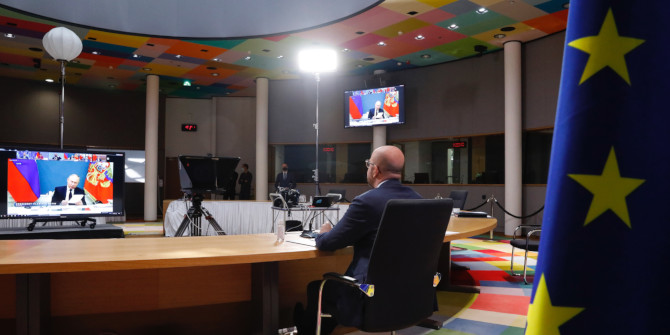Finland became a full member of NATO on 4 April. Shreya Sinha examines the potential impact of Finland’s accession on European security and cooperation between NATO and the EU.
Russia’s invasion of Ukraine has underlined the importance of the relationship between the European Union and NATO for European security and defence. Against the backdrop of the war in Ukraine, both the EU and NATO continue to share a vision of democratic values, human rights and the rule of law. In the face of a resurgent Russia, it is vital that the two security actors enhance their collective defence capabilities and move towards greater cooperation.
This was made visible with the signing of a joint declaration in January this year. The declaration reiterated the EU’s commitment to Article 5 of the NATO treaty, which states that “an armed attack against one or more member shall be considered an attack against them all”. This article has been invoked only once in NATO’s history, following the 9/11 attacks on the United States in 2001.
EU-NATO cooperation received a further boost with Finland’s NATO accession on 4 April. Finland shares a 1,340-kilometre border with Russia and by joining NATO, the country effectively renounced its long-standing commitment to military non-alignment and neutrality that it had maintained during the Cold War. NATO accession means that Finland can expand its security measures beyond what its national army can provide and offers protection against Russian aggression.
For NATO, on the other hand, Finland’s accession and the impending accession of Sweden is a geopolitical gamechanger as both countries are viewed as key military and political assets. With their well-equipped and modern military capabilities, as well as their stability and democratic institutions, they will serve as important and reliable partners for NATO in its efforts to enhance regional security and stability in northern Europe.
Russia’s response
Russia has opposed NATO expansion in the area and thus Finland’s accession is also predicted to have a number of geopolitical implications. Although the Finnish authorities have clarified that their choice to join the alliance is driven by security requirements and the need to protect their nation’s sovereignty and territorial boundaries, the Kremlin has perceived the move as a provocative act.
The accession of Finland and Sweden also highlights the expanding influence of the Baltic Sea region in the alliance’s security strategy. Ever since Russia’s annexation of Crimea in 2014, NATO has been attempting to extend its military presence in the region. Finland and Sweden’s strategic location in the Baltic region provides NATO with important access to the Baltic Sea as well as to the Arctic region, which is also critical for transatlantic security.
Adjusting to the new security environment
NATO has been confronted with new security challenges that move beyond the traditional security military prism. These include non-traditional security concerns such as cyber-attacks, hybrid warfare, and wider geopolitical tensions with Russia. The accession of Finland has been accompanied by a broader desire to modernise and adjust to the evolving security environment. In this context, Finland’s accession is a significant step towards reinforcing NATO’s deterrence and defence capabilities.
Finland’s entry into NATO signals a significant shift is underway and the beginning of a new era for European security. As the security landscape continues to evolve, NATO will be required to modernise and reinvigorate its capacities. This will be key not only for efforts to improve the alliance’s defence and security capabilities, but also because it will help promote stronger ties between North America and Europe.
There is now a clear need for Europe to secure its defence capabilities against a revisionist and aggressive Russia. Along with fostering greater collaboration among defence companies, the two security actors will have to work together to improve the compatibility as well as interoperability of their defence systems. The liberal model that underpins western alliances will remain a cornerstone of this strategy and the hope is that with the accession of Finland, NATO will be better positioned to shape the future global order.
Note: This article gives the views of the author, not the position of EUROPP – European Politics and Policy or the London School of Economics. Featured image credit: NATO North Atlantic Treaty Organization (CC BY-NC-ND 2.0)




